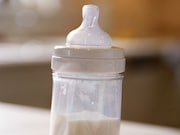Tag: Breast-Feeding
Parity, Breastfeeding Inversely Tied to Early Natural Menopause
Risk for early menopause lowest among those reporting exclusive breastfeeding for seven to 12 months
Antiepileptic Drug Exposure Low in Breastfeeding Infants
Median percentage of infant-to-mother AED concentration ranged from 0.3 to 44.2 percent
Breastfeeding May Protect Against Postpartum Relapses in MS
Pooled summary odds ratio of 0.63 found for correlation of breastfeeding with relapse
AAP: Most Moms Unconcerned With Informal Milk Sharing
78.2 percent of mothers using informal milk sharing do not medically screen donors
2009-2015 Saw Breastfeeding Up for Most Races/Ethnicities
Disparities in breastfeeding rates increased between black, white infants from 2009-10 to 2014-15
Racial Disparities Persist in Breastfeeding in U.S. Infants
Smaller differences ID'd between black and white infants who initiate breastfeeding
Complementary Infant Feeding Guidelines May Lead to Overfeeding
Halving breast milk, feeding per guideline resulted in overweight between 9 and 11 months for three guidelines
Feeding Examination Can Avert Surgical Frenotomy Procedures
After speech and language examination, 62.6 percent of infants did not undergo surgical procedure
Data Insufficient for Safety of Lithium During Breastfeeding
Lithium transfer to infants is variable; three cases of adverse effects reported, but confounding occurred
Receipt of Breast Milk Increases With Gestational Age at Birth
71.3 percent of extremely preterm and 84.6 percent of term infants received any breast milk














